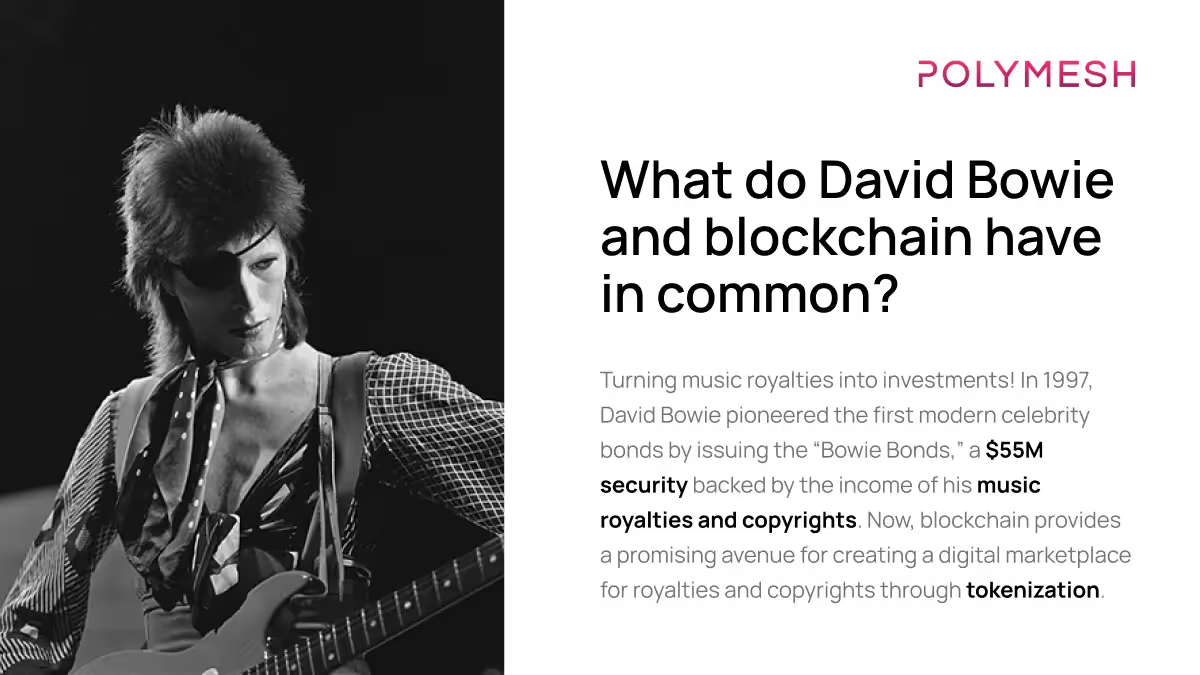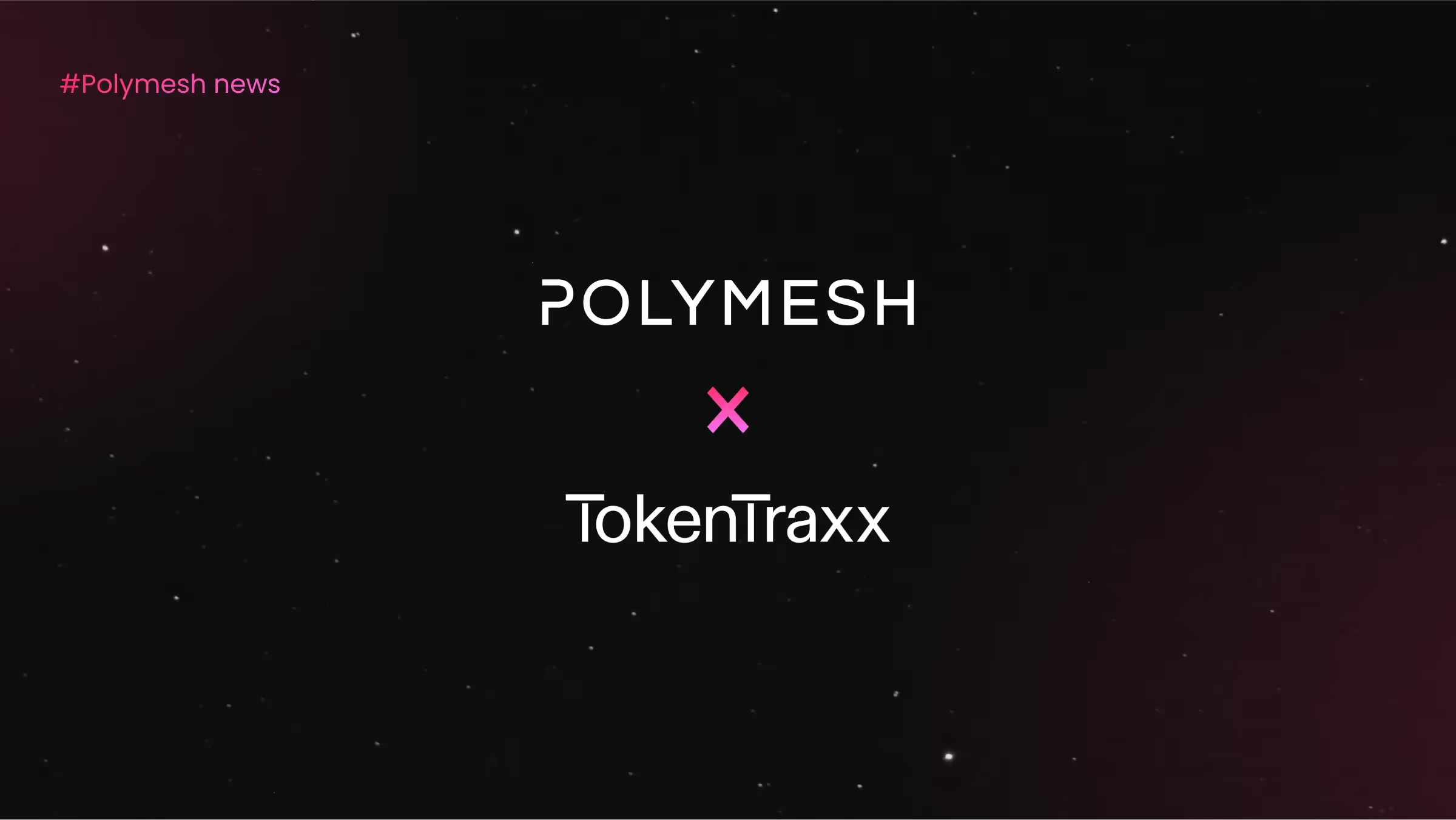Tokenized IP: How blockchain is making intellectual property more accessible
Through non-fungible tokens, or NFTs, blockchain technology is shifting the way creators, businesses, and investors interact with intellectual property assets. Just look at TokenTraxx – the company is using the Polymesh blockchain to enable musicians to issue tokens for music assets, which music lovers can purchase for a share in royalties, unlocking more democratic, fan-based monetization in the music industry and a truly collaborative environment for music production.
TokenTraxx’s innovative solution to solving monetization issues within the music industry shows the benefits of intellectual property tokenization. By enabling tokenization, blockchain technology transforms patents, trademarks, copyrights and other intellectual property assets into liquid, transparent and accessible digital assets that are easily exchangeable over a global network. This shift democratizes access to intellectual property investments and enhances the efficiency of intellectual property management and transactions.
In this blog, we explore how blockchain facilitates the full potential of intellectual property, or IP, through tokenization and the industries poised to benefit the most from this change.
What is tokenized IP?
Tokenized intellectual property refers to the digital representation of intellectual property assets on a blockchain, such as Polymesh. IP assets like patents, copyrights and trademarks can be converted into tokens representing ownership, usage rights, or investment shares. These tokens are tradable on the global decentralized ledger, making IP more accessible to a broader audience.
How does blockchain enable tokenized IP?
Blockchain’s inherent transparency, immutability, and programmability make it an ideal platform for tokenizing intellectual property. Beyond bringing unparalleled efficiency and faster settlement times, blockchain boosts intellectual property management and transactions in the following ways:
- Immutable ownership records: Blockchain creates an immutable record of ownership, where change is only possible via consensus and the chain history is always available, ensuring that IP rights are traceable and tamper-proof while enhancing trust among participants.
- Automation and smart contracts: Automated agreements or smart contracts executed on the blockchain streamline processes like licensing, royalties and profit sharing, reducing administrative overhead and enabling faster execution of payments.
- Fractional ownership: Tokenization facilitates the division of IP assets into smaller shares, enabling fractional ownership and opening up investment opportunities to a wider market. What once required a high investment minimum and investment in the whole asset can, theoretically, be offered in part for the price of $1.
- Global accessibility: Blockchain eliminates geographic barriers in investing, making it easier to buy, sell, or license IP assets across borders. There are no 9-5 time restrictions like there are in traditional markets.
Besides these advantages, choosing the right blockchain infrastructure can also boost regulatory compliance. For example, on Polymesh, it’s possible to set customizable compliance rules for tokens that enforce automatically with transactions. These rules can be altered anytime, enabling token managers to keep up with evolving regulations.
How does blockchain ensure security and traceability?
Blockchain provides robust security and traceability by relying on decentralized nodes for consensus, reducing the risk of one party gaining undue influence over the network. On Polymesh, security is enhanced through permissioned node operators, whereby only licensed financial entities can run the operator nodes that vote on blocks for inclusion into the chain.
Each tokenized IP asset uses a unique ticker, preventing assets from being duplicated or counterfeited. Through its distributed set of nodes, the decentralized ledger enables transactions to be logged immutably, providing a clear trail of ownership and usage rights for IP tokens.
During transactions, blockchain leverages automation to ensure all agreements related to the asset execute as intended, reducing the risk of fraud and human error. On most blockchains, this involves programmable smart contracts, which are complex, expensive, third-party self-executing agreements. Polymesh streamlines this process and reduces costs by rolling this function into the protocol layer and tokens themselves. For example, the compliance rules that issuers can set are embedded into the tokens themselves, enabling the enforcement of compliance rules without the use of smart contracts.
Benefits of tokenized IP
Tokenizing IP offers significant advantages for individual creators and entrepreneurs alongside both small and large businesses, as well as their investors. Aside from the general benefits – immutability, security, efficiency – blockchain technology affects intellectual property by facilitating:
- Increased liquidity: Traditional IP markets are often illiquid, with transactions requiring extensive negotiations and legal processes. Tokenization enables seamless trading of IP assets, similar to stocks or cryptocurrencies.
- Enhanced transparency: Blockchain’s transparency ensures that all transactions and ownership changes are verifiable, reducing disputes and fostering trust between parties.
- Broader accessibility: Fractional ownership and the digital nature of tokens lower the barriers to entry, allowing individuals and smaller investors to participate in IP markets.
- Automated management: Smart contracts and other automation simplify the management of IP rights, automating royalties, licensing and compliance checks.
Industries best suited for tokenized IP
Several sectors stand to benefit immensely from the tokenization of intellectual property.
Tech
Tech companies frequently deal with patents and trade secrets. Tokenization simplifies patent licensing and monetization, enabling startups and smaller innovators to access valuable IP.
Entertainment
From music rights to film copyrights, tokenization democratizes access to creative works. Fans can invest in fractional ownership of a song or movie, sharing its financial success.
On Polymesh, TokenTraxx is doing just that by enabling the creation of music NFTs for up-and-coming artists. TokenTraxx has done a free NFT offering to the Polymesh community in collaboration with singer-songwriter Evan Malamud and recently announced an NFT drop on Polymesh from Josh Savage.
Pharmaceuticals
Pharmaceutical companies rely heavily on patents for revenue. Tokenization facilitates efficient patent trading and partnership formation, accelerating the development of new drugs.
Outside of supply chains and data tracking, tokenization hasn’t broken through to the pharmaceutical industry in any major way yet. Given the South Korean tokenization market's preference for unconventional assets in culturally and economically significant industries and the nation’s attempt to raise itself as a global pharmaceutical production base, we wonder if South Korea will be one of the first countries to capitalize on the opportunity it presents.
Fashion + Luxury Goods
Trademarks and designs in these industries can be tokenized, enabling companies to protect their brand while offering unique investment opportunities to their audience.
One company enabling the tokenization of real world assets such as intellectual property on Polymesh is Tokenise, a tokenization provider which features a brokerage, exchange, and central securities depository specifically for digital assets. Tokenise uses Polymesh for its speed and cost since building on general-purpose blockchains like Ethereum leaves projects liable to transaction fees that can be higher than the value of the trade itself.
Conclusion
Change is on the horizon for intellectual property as tokenization boosts the transparency, accessibility, and liquidity of IP assets.
Industries like technology, entertainment and pharmaceuticals are already reaping the benefits of blockchain-enabled IP tokenization. The first company to get involved in IP tokenization on Polymesh, TokenTraxx, is leading the way regarding the intellectual property of music assets. The innovative creator-centric platform is helping artists create music NFTs, which are available for fans to participate more directly in the music production of up-and-coming artists.
For financial institutions and investors, tokenized IP assets present a unique opportunity to diversify portfolios with secure, innovative digital assets not ordinarily available in traditional investing. Polymesh looks forward to welcoming these IP assets onchain and driving the tokenization of real world assets through intellectual property tokenization.
Learn how blockchain makes intellectual property investable and discover the benefits of tokenizing IP assets for issuers and investors.
Transform intellectual property by representing assets onchain. Tokenize on Polymesh and unlock better efficiency, transparency, and liquidity of IP assets.









































